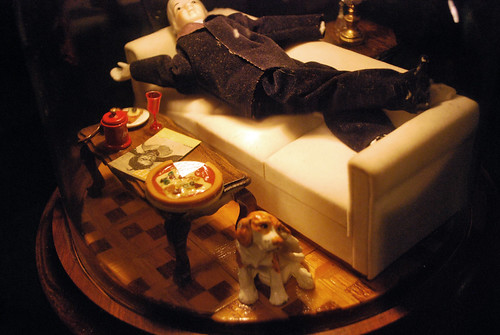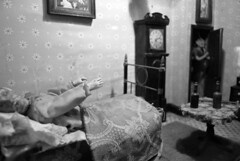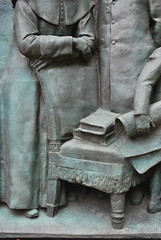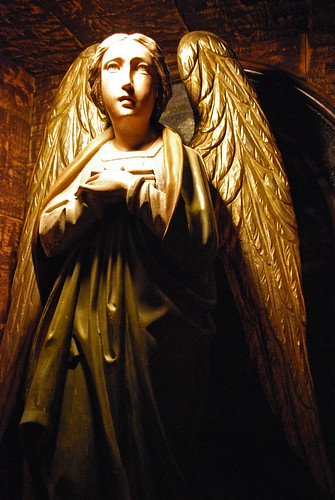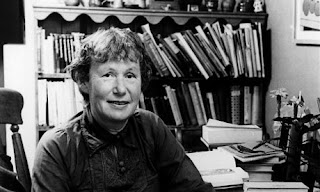This is the point where, back in an earlier century, I would have turned the letter on its side and begun writing across what was already there. Fortunately for your sanity, technology has saved you from having to read the enormity that would be the result of such a technique employed in my hideous handwriting.
1 In writing about So I Have Thought of You, the new collection of
Penelope Fitzgerald's letters, I can't believe that I forgot to mention why a good portion of the letters from the first half or so of her life are missing: they were in her houseboat,
Grace, when it sank in the Thames. Fans of her Booker Prize-winning
Offshore (1979), a novel about an eccentric community of houseboat owners struggling to survive on the muddy banks of the Thames, may not be surprised--at least until they learn that this was the second time
Grace sank. Once, for most of us, would have been enough.
2 Maud Newton and I corresponded off and on over several weeks recently about the possible fate of
Iris Murdoch's letters, with me worrying that Murdoch's innate secretiveness surely meant that she was a burner of letters. But it took
Jenny Davidson to suggest that the answer might be on my bookshelves: demonstrating yet again that she's a scholar while I'm just a dilettante, she pointed out that
Peter Conradi, in his
Iris Murdoch: A Life (2001), probably at least mentions whether he had recourse to her letters. The resulting list tidbits about the topic, which I fired off in an e-mail to Jenny and Maud, is now
part of a post at Maud's site. Short answer: there was probably some serious burning.
3 To close
my post Wednesday about
Sybille Bedford' s
A Legacy, I drew on some praise for the book that
Nancy Mitford included in a letter to
Evelyn Waugh. Waugh, on the other hand, though he "read it straight through with intense pleasure," disagrees with me about its second half being the richer portion:
For the first half--up to the marriage of Jules & Melanie--I was in full agreement '"one of the best novels I ever read" as you say. After that I found a slight falling off, as though the writer had suddenly taken a stiff dose of Henry James, particularly in the long talks between Sarah & Caroline. Also I think it was clumsy to have any of the narrative in the first person. The daughter relates things she cannot possibly ever have known as though she were an eye witness. But these are small blemishes. What a brilliant plot!
Later in the letter, he, ponders, tongue in cheek, on the identity of the book's author:
I wondered for a time who this brilliant "Mrs Bedford" could be. A cosmopolitan military man, plainly, with knowledge of parliamentary government, and popular journalism, a dislike for Prussians, a liking for Jews, a belief that everyone speaks French in the home . . .
4 In her introduction to the 1999 Counterpoint edition of
A Legacy, Bedford notes that the book was less than a success on publication, though Waugh gave it a strong review in the
Spectator. "Such reception as it had was mostly bewildered or hostile or both." Even her publisher was less than fully committed to the book, though for extra-literary reasons:
George Weidenfeld was in the midst of troubles of his own--wives and Cyril Connolly--he gave me lunch at the Ritz on a bad day for him and was openly sad.
From Jeremy Lewis's
Cyril Connolly: A Life (1997) we learn that this was the period when Weidenfeld, his marriage having collapsed, was busy diving into an affair with Connolly's wife,
Barbara Skelton.
It began, Skelton claims, when Connolly himself told her that, as he had fallen for
Lucien Freud's wife,
Caroline Blackwood (who wanted nothing to do with him), he wouldn't mind her finding "a rival attraction of her own . . . provided he was a gentleman." It didn't take long: accidentally brushing hands at the theatre, Weidenfeld and Skelton "were suddenly aware of an intense and mutual physical attraction"; things proceeded apace, with childishness, misbehavior, and hideous scenes on all sides. Evelyn Waugh, rarely inclined to be generous about another's troubles, complained that
Connolly's cuckolding is a great bore. I dined with him and he went on and on.
Connolly's mother, on the other hand, was more vitriolically understanding, opening her argument with the unintentionally ridiculous line,
I think it is the last straw that it should it be your publisher. . . . I think a lioness would have repaid you more [than Barbara has]--animals have not spite and deliberate cruelty. . . . [P]ut her out of your mind and leave her to her present keeper.
Divorce ensued, followed by a quick marriage between Skelton and Weidenfeld that the bridegroom described as "a dismal affair, more like a wake than a wedding." The marriage itself was as brief and unpleasant as the affair had been long and passionate:
Life as a publisher's wife proved entirely uncongenial to Barbara. She claimed that she hated being woken every morning to the rustle of newspapers, was bored by Wiedenfeld's business talk and tireless ambition, and refused to play the part of the compliant, charming publishing hostess, despite his begging her to "Gush! Gush! You must be more gushing!"
It's not hard to see why Anthony Powell fixed on Skelton as the model for Pamela Widmerpool, isn't it? Skelton wrote
two volumes of memoir, which I'm beginning to think I need to read.
5 This final item doesn't quite qualify as a true postscript, as I haven't really written about Cyril Connolly in recent weeks, but as he's a topic that's perpetually bubbling under the surface in these parts, you can consider it a postscript to I've Been Reading Lately in general. From
his journal for 1931, a few lines for a city summer:
London now completely summer. Trees, tawdriness spreading west from Tottenham Court Road, evening pavements crowded with aimless sex. V. Woolf asked Elizabeth what unnatural vice was--"I mean what do they do?"
And that's all for tonight, for I find myself once again, as Connolly jotted down elsewhere in his journal, "Proust-ridden."
The Prisoner calls.
